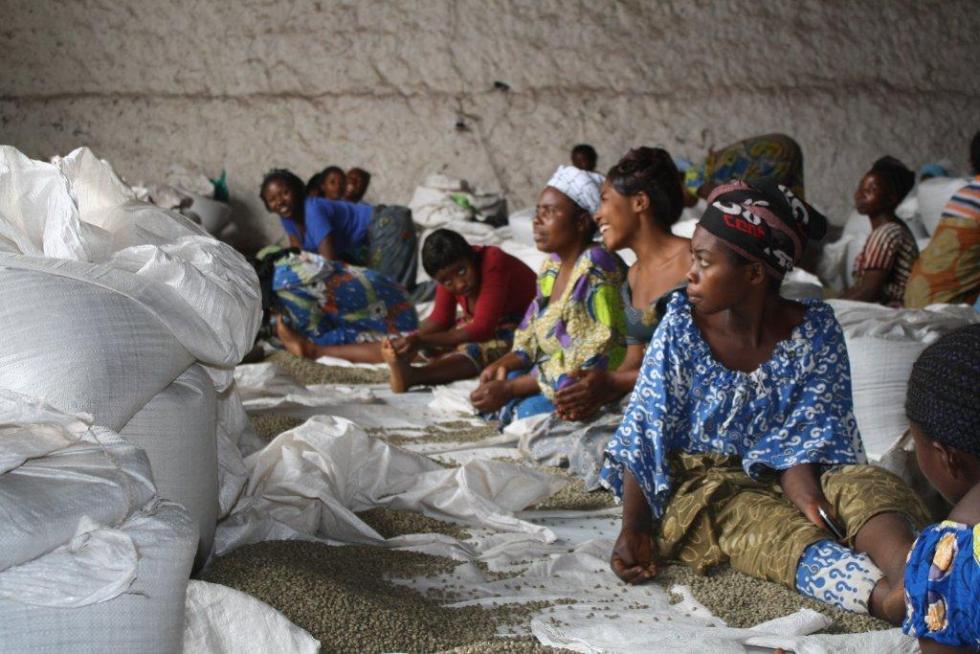Last summer, I accompanied a group of coffee buyers to the Democratic Republic of Congo (DRC). Above all the accounts I heard from coffee farmers (both appalling and inspiring), one moment stuck in my mind. I was visiting a women’s committee to see how they were spending the 2 cents premium per lb of coffee that Twin negotiates on their behalf.
Not only had a community flourmill had been built, a motorboat service had also been set up on the giant Lake Kivu to taxi residents about. I ask the women, dressed in their colourful Sunday best, how they will spend the extra income from these businesses. They are full of ideas; hands stretch up to announce medicines, pigs and cows to bring in yet more money, school books and lessons for the kids. But poignantly, one woman simply says she will send herself to school – it’s her time now; she wants the education she and countless others like her were denied.
Challenges faced by women farmers in the DRC
According to FAO figures, 73% of working women are farmers in the DRC and half of all farmers in the country are women. Despite this central role, women often have little say in the running of their farm or on how household income is spent. This is compounded by additional barriers to men in accessing credit and owning land – less than 1% of land is owned by women in sub-Saharan Africa.
Last year, Twin undertook a study to understand the role that women play within our own supply chains and the challenges they face. The report Empowering women farmers in agricultural value chains found that despite providing the majority of the labour (on top of household duties), it is men who take the crop to market and complete the sale. Along with the responsibility, men get the power; power over information on market prices, power over expenditure, power over the business of farming.

Photo courtesy of Twin
The role that business can play in empowering women farmers
Businesses can play a transformative role in unsetting the poverty trap for farmers, including women. As I witnessed firsthand in the DRC, Twin’s partnership with Sainsbury’s and Finlays is already bearing fruits in the most challenging circumstances. Last summer, Sopacdi was the first ever single origin coffee from the DRC to go on sale in the UK. Now, demand for Sopacdi coffee is far outstripping supply and the cooperative, in partnership with Twin, won the SCAA Sustainability Award 2014.
In terms of the premium for products produced by women buyers pay, just small investments have brought change – to the confidence and standing of the women concerned, but also to the wider community. Not only did the women’s groups have smart business ideas, they also set up much needed community services, such as the mill and motor boat service. In a development sense, women show a high return on investment because they prioritise spending on family health, education and food security. The FAO estimates that if women farmers had the same access to agricultural inputs and credit as men, there would be up to 150 million fewer people living with hunger.
Making the case to businesses about women’s empowerment
So the development case is clear, but why should businesses invest in women? Firstly, as our report shows, women tend to take the lead at crucial stages of the production process that influence quality, taste and even food safety. In the commodities looked at, women are largely responsible for shelling and grading nuts, fermenting and drying coffee and fermenting cocoa. Secondly, our report showed women are often more responsible with money, so giving them leadership opportunities can lead to more efficient, reliable producer organisations. Businesses can be a catalyst for change by establishing corporate gender policies that encourage suppliers to commit to equal representation for women on co-operative boards, as well as in the general membership.
Finally, businesses should not forget that as well as depending on women to grow their ingredients, they rely on the custom of women to make a healthy profit. And, in an increasingly crowded market for ethical goods, deeper Fair Trade engagement is needed to stand out from the pack.
This March we launched a fully-traceable coffee, produced by women growers in partnership with Sainsbury’s. This Rwandan Kopakama coffee also carries a premium to support women members of the cooperative. This reminds us as shoppers that the prevailing image of a farmer around this world is of a woman – not a man. It also demonstrates to the women involved in the project that they are not forgotten, they are not invisible – in fact, that we appreciate their hard work. This is a powerful message at both ends of the value chain, one that supports development, quality and the sustainability of smallholder agriculture.



